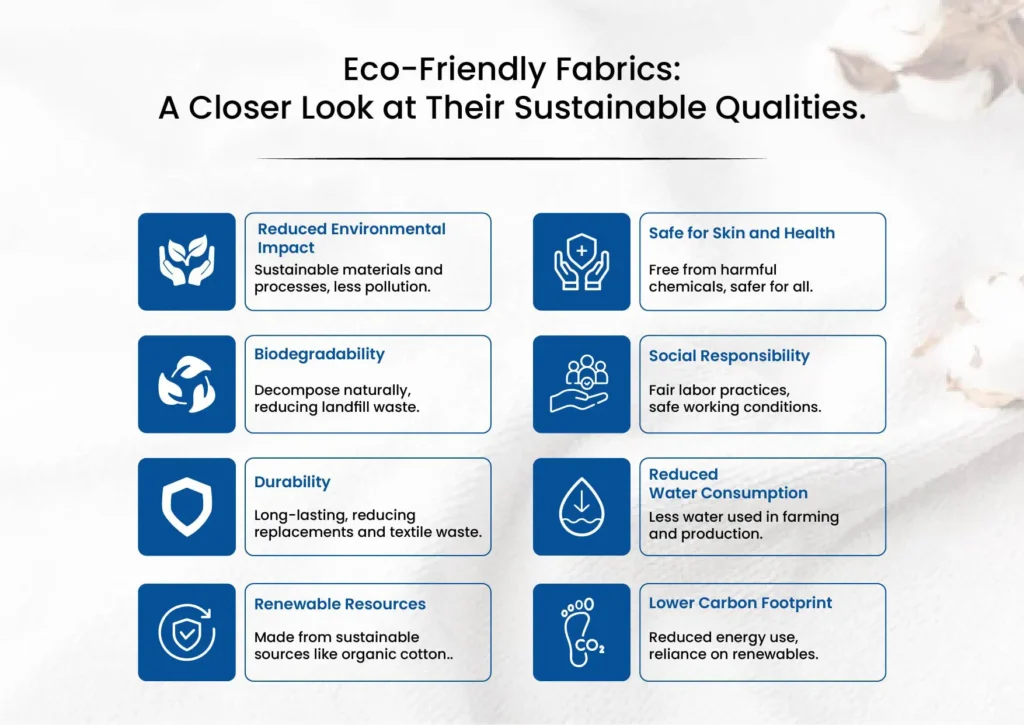- Home
- About
- Products
Single Fill Duck
Army Duck Fabric
Numbered Duck
- 200 GSM Cotton Polyester Mix Canvas Fabric
- 220 GSM Cotton Polyester Mix Canvas Fabric
- 290 GSM Cotton Polyester Mix Canvas Fabric
- 295 GSM Cotton Polyester Mix Canvas Fabric
- 315 GSM Cotton Polyester Mix Canvas Fabric
- 375 GSM Cotton Polyester Mix Canvas Fabric
- 390 GSM Cotton Polyester Mix Canvas Fabric
- 470 GSM Cotton Polyester Mix Canvas Fabric
- Eco Weav
- Re Weav
- Certificates
- Contact Us

Eco Friendly Fabric Manufacturers: Weaving a Greener Future for Textiles
In the textile industry, the call for sustainability is echoing louder than ever. Consumers and brands alike are seeking eco-friendly alternatives that minimize the environmental impact of fashion and home furnishings. This demand has given rise to a new breed of manufacturers – eco friendly fabric manufacturers. These pioneers are dedicated to producing textiles that are gentle on the planet, while maintaining the highest standards of quality and ethical production.
As a leading eco friendly fabric manufacturer in India, Radhey Krishna Cotweaving is committed to weaving sustainability into every thread, from the sourcing of raw materials to the final finishing touches.
The Essence of Eco-Friendly Fabric Manufacturing
Premium eco-friendly fabrics manufacturing encompasses a holistic approach that considers the entire lifecycle of a textile. It starts with the responsible sourcing of raw materials, such as organic cotton, recycled fibers, or sustainably harvested natural fibers like hemp or bamboo. The manufacturing process itself prioritizes minimizing water and energy consumption, reducing waste generation, and avoiding the use of harmful chemicals. Furthermore, ethical labor practices and fair wages are fundamental to the philosophy of eco-friendly fabric production.
Characteristics of Eco-Friendly Fabrics

Eco-friendly fabrics possess a range of characteristics that distinguish them from conventional textiles:
1. Reduced Environmental Impact: By utilizing sustainable raw materials and responsible manufacturing processes, eco-friendly fabrics minimize their impact on the environment.
2. Biodegradability: Many eco-friendly fabrics are biodegradable, meaning they decompose naturally at the end of their lifecycle, reducing landfill waste.
3. Durability: Eco-friendly fabrics are often crafted to be durable and long-lasting, reducing the need for frequent replacements and minimizing textile waste.
4. Renewable Resources: Many eco-friendly fabrics are made from renewable resources like organic cotton, ensuring a continuous supply of raw materials.
5. Safe for Skin and Health: The absence of harmful chemicals in eco-friendly fabrics makes them safer for both consumers and workers involved in their production.
6. Social Responsibility: Eco-friendly fabric production often prioritizes fair labor practices and safe working conditions, contributing to the well-being of workers and communities.
7. Reduced Water Consumption: Sustainable farming and manufacturing practices significantly reduce water usage compared to conventional textile production.
8. Lower Carbon Footprint: Eco-friendly fabrics often have a lower carbon footprint due to reduced energy consumption and reliance on renewable resources.
Applications of Eco-Friendly Fabrics
The versatility of eco-friendly fabrics extends to a wide range of applications:
1. Apparel: From everyday wear to high-fashion garments, eco-friendly fabrics offer sustainable choices for conscious consumers.
2. Home Textiles: Bedding, curtains, upholstery, and other home furnishings can be crafted from eco-friendly fabrics, creating a healthier and more sustainable living environment.
3. Accessories: Bags, hats, and other accessories made from eco-friendly fabrics offer a stylish and sustainable alternative.
4. Industrial Textiles: Eco-friendly fabrics are finding increasing use in industrial applications, such as geotextiles and filtration fabrics.
Radhey Krishna Cotweaving: A Pioneer in Eco-Friendly Fabric Manufacturing
Radhey Krishna Cotweaving, a family-owned business with a rich heritage in the Indian textile industry, is proud to be a leading environment friendly fabric manufacturer in India.Our commitment to sustainability is woven into every aspect of our operations, from the sourcing of raw materials to the final production processes.
We prioritize ethical practices, ensuring the well-being of our workers, the protection of the environment, and fair treatment of our suppliers and all stakeholders. We believe in transparency and traceability, offering complete visibility into our supply chain and production methods.
Our dedication to sustainability is reflected in our comprehensive list of certifications, including:
- GOTS: Certifies organic fibers and sustainable production.
- OEKO-TEX: Ensures textiles are free from harmful substances.
- OCS 100: Verifies products contain 100% organic material.
- OCS Blended: Traces and verifies blended organic content.
- GRS: Certifies recycled content and sustainable processing.
- BCI: Promotes sustainable cotton farming practices.
- RCS Blended: Tracks and verifies blended recycled content.
Conclusion: Eco Friendly Fabric Manufacturers - Shaping a Sustainable Future
Eco friendly fabric manufacturers are playing a pivotal role in transforming the textile industry, paving the way for a more sustainable and responsible future. By choosing eco-friendly fabrics, we can collectively reduce our environmental impact and create a healthier planet.
At Radhey Krishna Cotweaving, we are committed to providing high-quality, eco-conscious fabrics that meet the needs of discerning consumers and businesses. Contact us today to explore our range of sustainable textiles and join us in weaving a greener future for the textile industry.

